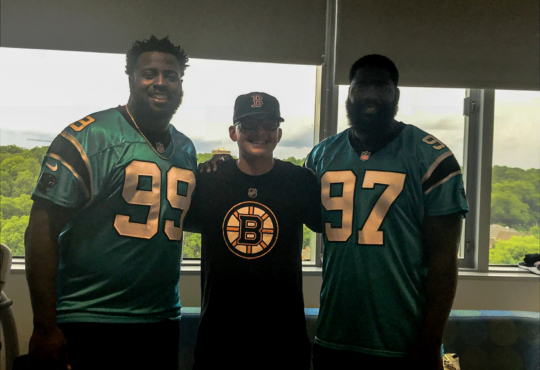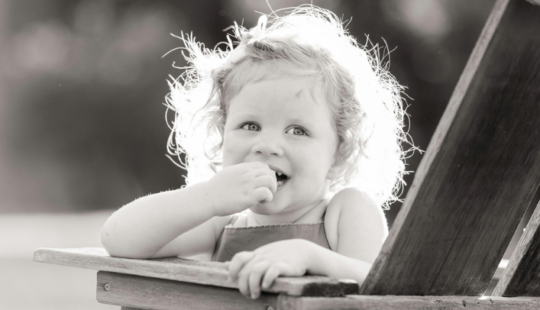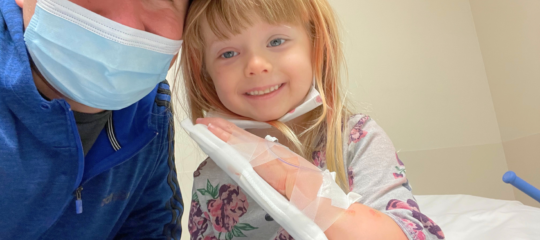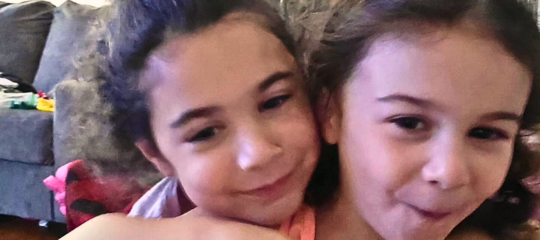
The Last Birthday: A Father and Advocate Shares the Personal Impact of Pediatric Brain Cancer

Mike Henry, the Pediatric Brain Tumor Foundation’s Director of Advocacy, understands first-hand the devastating impact of pediatric brain cancer and why urgent and substantial action is needed to address this growing public health crisis. In 2019, his daughter Blair “BB” Henry celebrated her final birthday before passing away from brain cancer. She was three years old. He shares “BB” and his family’s story in this essay.
I stood by the bouncy castle in the backyard with an unfocused stare, trying to muster the energy to start my errands. We had been discharged for just a few days. Our attention had been trained on my daughter’s blood results. Would her immunity levels be high enough for us to celebrate? Her last birthday was here.
The previous month was hellish. Her biopsy left half of her body mostly limp. The harsh chemotherapy drugs decimated her tiny body. All her hair fell out over what seemed like a few hours. We had sleepless nights watching her chest for active breathing because her throat had almost swollen shut from the mucositis. Hospital equipment beeps became the soundtrack of every waking second. The traumatic moments compounded until it all felt normal.
That all feels so unnecessary now. The tumor that was wrapped around her brain stem put that treatment plan in motion before we realized the reality of her future. Our care team knew before we did. Her 40-year veteran neuro-oncologist burst into tears while talking about her deteriorating health. They gently helped guide our decision to transition to palliative care. They gifted us good months of memory-making.
On the precipice of three years old and gearing up for her final birthday. This was supposed to be the first birthday party she remembered. A memory you look back on with fondness. Our definition of memorable had changed. Sadness threatened to derail event planning at any second, but we pushed ahead.
The day saw friends, family and supporters trickle through. There were games, an ice cream truck, and an outdoor movie screening. For the first time in weeks, she wasn’t a cancer patient. She was a kid who couldn’t wait to eat cake with her friends and family. There were flickering moments of what our life was like pre-diagnosis. For weeks we had small moments just like this. These were the snapshots most people saw. Laughter and fun. Trips to fun places, surrounded by our inner circle.
Most didn’t see her decline. They weren’t included in the daily conversations about the strength of her morphine doses. They didn’t see the steroids bloat her entire body to the point of near immobilization. They didn’t hear her voice start to give out. That was the first sign. We knew her tumor would grow until there wasn’t any room left. It was like waiting around to get hit by an oncoming truck. Eventually, she would lose consciousness, her body would shut down her ability to breathe, and we would have to watch her suffocate for several hours until she passed.
Many people know parents like me who obsess over what ailed their child. It can feel a bit much to folks who haven’t experienced those awful moments. When we only allow the world to see the good moments, it can be hard to understand why we can’t stop talking about the bad. The horrors of childhood cancer create the urgency we feel.
Children with brain cancer can’t wait another week, another day, another minute for your support. When you donate to the Pediatric Brain Tumor Foundation, you help fund life-changing research and provide families with the resources and support they need. Don’t let pediatric brain cancer steal another future.
In September, a comprehensive report published by the Central Brain Tumor Registry of the United States and funded by the Pediatric Brain Tumor Foundation found that pediatric brain cancer is now the most commonly diagnosed childhood cancer in the United States. It is also the deadliest and only getting worse, while adult brain cancer patients are experiencing a decline in the incidence of diagnosis and mortality rates.
Pediatric brain cancer trends are moving in the opposite direction of those for adults because childhood cancer does not receive the same level of attention or financial commitment as adult cancers. The lack of focus and funding means slow progress for the more than 120 types of pediatric brain tumors in need of treatment advancements.
Since my daughter’s passing, I have met some of the most remarkable people in the world. They are happy warriors who continue to carry their child’s memory or compassionate caregivers entrenched in the battle. They are inspiring survivors dealing with complex side effects or siblings advocating for their brothers and sisters. We are all working to change the outcome for families like ours. It’s time to make childhood brain cancer a priority. Every kid deserves their next birthday.
The Pediatric Brain Tumor Foundation is committed to leading the way toward a better future for kids, and we need patient advocacy organizations, pharmaceutical companies, researchers, and caring individuals like you to walk alongside us as we address pediatric brain cancer’s impact. You can make your voice heard by advocating for families in your local community and across the country. Sign up now to be an advocate with PBTF: www.curethekids.org/advocate.
Related Stories


Living with a Glioma: Eight-Year-Old Mackensie is an Inspiration
Mackensie's journey began in early 2018, just before her second birthday. Now an energetic eight-year-old third grader in Las Vegas, she has faced a path filled with medical challenges, surgeries, and treatments—facing each with remarkable courage and positivity.

From Despair to Hope: How Advocacy Saved Audrey's Life
Audrey, a spirited 5-year-old from Spartanburg, South Carolina, embodies a story defined by perseverance, the power of love, and a mother’s relentless determination to uncover the truth behind her child’s mysterious symptoms.
Related Updates
Getting families where they need to be without worrying about the cost of transportation.
Pediatric Brain Tumor Foundation and Uber Partner to Provide Travel Credits for Families Navigating Challenges of Pediatric Brain Tumor Diagnosis
The Pediatric Brain Tumor Foundation (PBTF) and Uber are joining forces to provide essential support for families navigating the challenges of pediatric brain tumors.
Accelerating Kids' Access to Care Act: Improving Healthcare for Children Across State Lines
The Accelerating Kids’ Access to Care Act, passed the U.S. House of Representatives on September 17 to improve children’s access to essential health care, while eliminating administrative burdens for providers and states.

